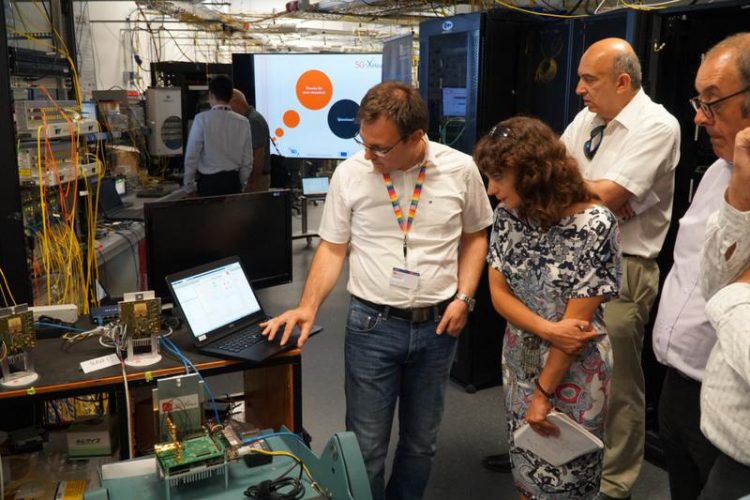Three years research on next generation of mobile communication (5G) sucessfully finished

Technical demonstrations of the results of 5G-XHaul in the Smart Internet Lab during the final event at the University of Bristol. University of Bristol
The EU-funded research project 5G-XHaul, coordinated by IHP – Innovations for High Performance Microelectronics, concluded at the end of June 2018 with the final event at the University of Bristol, UK. The event included a set of technical demonstrations hosted at the Smart Internet Lab and a final field trial across the city of Bristol.
The main purpose of 5G-XHaul was to help ensure that every smartphone user has a reliable, uninterrupted and very high speed network connection. The project also aimed to find solutions to the growing demand for broadband connections.
To meet this demand cost-effective yet powerful networks had to be developed and one of 5G-XHaul’s main focuses was on ensuring inner city areas, stadiums, airports and other transport hubs are connected to the core telecommunications network with dynamically adaptive communication. It also supports mass events where peaks in demand are likely and dynamic allocation of resources is, therefore, necessary to efficiently meet the quality requirements of the end-users.
A city-wide field trial, carried out in Bristol, integrating the novel 5G-XHaul optical and wireless technologies, showcased the overall project architecture. The functionality and end-to-end performance of this field demonstration verified the suitability of the 5G-XHaul solution for 5G.
“All demonstrations ran very smoothly and robustly showing the developed concepts in practical applications. This is the result of some intense work and constructive cooperation over the last three years. All partners will benefit from the outcome of this joint work which is reflected in scientific publications, standards, patents and product developments. In fact, most partners are continuing their cooperation in another European Project with the acronym 5G-PICTURE.”, said Prof. Eckhard Grass (IHP).
5G-XHaul is a Phase 1, collaborative project under the framework of the 5G-Public Private Partnership (5G PPP), which itself is a joint initiative between the European Commission and the European information and communications industry and has been set up to specify the requirements for 5G and once done aid in developing 5G solutions. The Project was funded by the EU research and innovation program Horizon 2020.
“IHP has actively and successfully coordinated the H2020 project 5G-XHaul, and was involved in several Working Groups of the European 5G Public Private Partnership initiative (5G-PPP). 5G-XHaul, a project of 12 Partners from industries and academia has fostered several individual partnerships to the benefit of all parties involved. IHP has mainly contributed its expertise in mmWave communications and localization techniques and has developed further the existing skills, which is reflected in the different tangible results, as well as publications and patents produced within the duration of the project. One key result has been the development and integrating of the 5G-XHaul mmWave beamforming Analog Front-End solution, which will be used in future activities and projects.”, stated Dr. Jesús Gutiérrez Terán (IHP).
https://ec.europa.eu/programmes/horizon2020/
https://www.5g-xhaul-project.eu/
http://www.bristol.ac.uk/engineering/research/smart/projects/5g-xhaul/
Media Contact
All latest news from the category: Information Technology
Here you can find a summary of innovations in the fields of information and data processing and up-to-date developments on IT equipment and hardware.
This area covers topics such as IT services, IT architectures, IT management and telecommunications.
Newest articles

NASA: Mystery of life’s handedness deepens
The mystery of why life uses molecules with specific orientations has deepened with a NASA-funded discovery that RNA — a key molecule thought to have potentially held the instructions for…

What are the effects of historic lithium mining on water quality?
Study reveals low levels of common contaminants but high levels of other elements in waters associated with an abandoned lithium mine. Lithium ore and mining waste from a historic lithium…

Quantum-inspired design boosts efficiency of heat-to-electricity conversion
Rice engineers take unconventional route to improving thermophotovoltaic systems. Researchers at Rice University have found a new way to improve a key element of thermophotovoltaic (TPV) systems, which convert heat…



